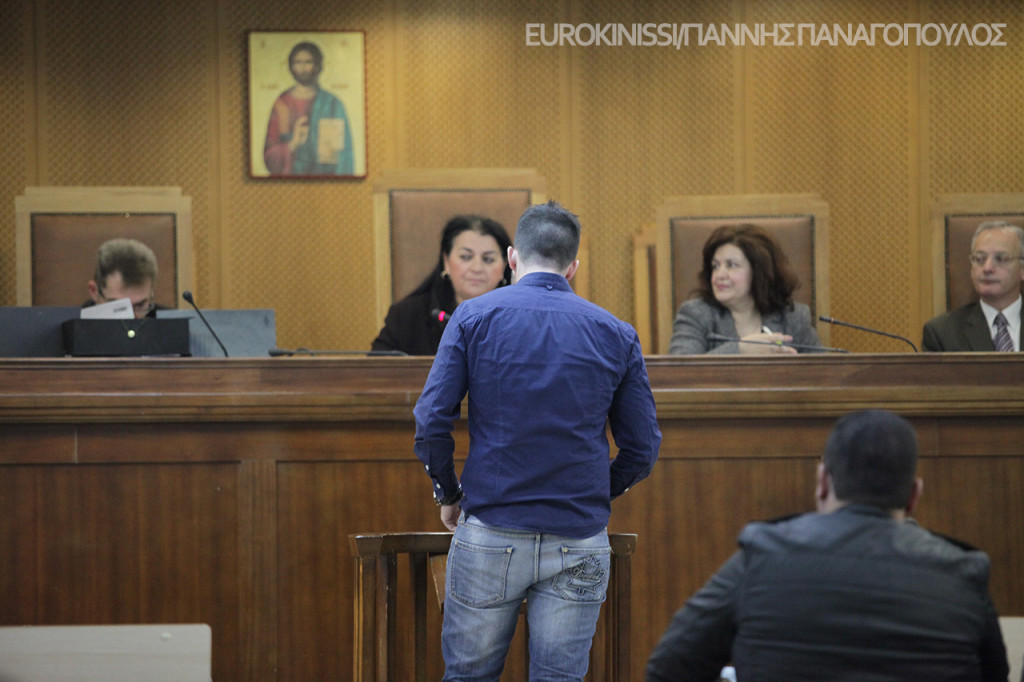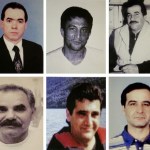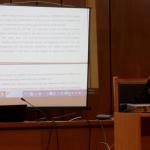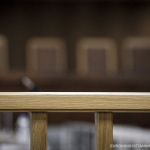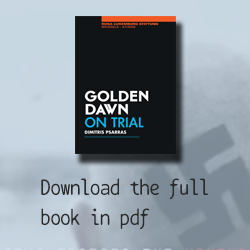25th Hearing, Women’s Section, Korydallos Prison, Athens, 4 November 2015
1. Court access
Hearings remain accessible to members of the public, provided they present their identity cards at the entrance. However, the crowd in the courtroom had thinned. The spaces reserved for journalists are almost always occupied. A malfunctioning microphone added to the list of problems with the venue. An hour into the hearing (which began at 09:15), the court went into recess for 15 minutes so that the microphone could be fixed.
2. Presence and representation of the defendants
Seven (7) defendants were present at the beginning of the hearing. Twenty-one (21) defendants were listed as absent. The remaining defendants were represented by their counsel.
3. Statements and comments from the defence regarding the testimony of Dimitris Melachrinopoulos
Christoforos Tsagkas (counsel for Ioannis Aggos, Giorgos Germenis and Anastasios Michalaros) began by noting Dimitris Melachrinopoulos’ confusion when he gave his first statement after the murder and suggested that this confusion continues to prevail as the witness is called to recall that night. He asked whether that confusion, rage and grief “for the untimely loss of his friend” are still affecting his statements.
He used an example from Melachrinopoulos’ testimony to support his claim that he was an unreliable, insincere and imprecise witness, bent on ensuring that the defendants are found guilty. He claimed that while Melachrinopoulos, in his statement, said that Aggos and his companion, who were sitting at the table next to Fyssas in Koralli bar, were constantly sending messages, this was not supported by the evidence found after the lifting of confidentiality on the two individuals’ communications. He noted, moreover, that there is a contradiction as regards the identity of the arresting officer: was it a motorcycle policeman or a patrol officer, as Melachrinopoulos claimed? Furthermore, he questioned Melachrinopoulos’ ability to distinguish the men on the other side of the road, his sincerity with regards to how many people he recognised that night and who they were, and with regards to the matter of whether those people could have prevented the murder.
Taking the floor, N. Kontovazenitis (counsel for Anastasios Anadiotis) raised further purported discrepancies and contradictions between the witness’s testimonies which he maintained were not justifiable given the witness was a young person. The counsel went so far as to question whether the witness was even present at the scene and, thus, his status as an eyewitness; in his opinion, the logical thing for him to have done would have been to hide like the others. Kontovazenitis focused in particular on the following points in Melachrinopoulos’ testimony: the matter of why eight people would leave one bar to go to another where only three people were hanging out instead of the other way around; the discrepancies in the witness’s statements regarding the beating of Fyssas; differences in the timelines of the incident; discrepancies regarding Fyssas’ identification of his killer. Moreover, the counsel noted that the 5-6 people surrounding Fyssas could not be tried for complicity under article 47 of the criminal code given they merely surrounded Roupakias and Fyssas, rather than actively encouraged Roupakias. He questioned whether Melachrinopoulos had actually carried the blood-stained Fyssas, given it is illegal even in accidents, as he claimed. In the context of questioning Melachrinopoulous’ presence on the scene, the counsel raised the fact that Fyssas’ father had not mentioned Melachrinopoulos in his testimony. Moreover, he insisted that Melachrinopoulos’s statement that Kontonikolas or anyone else could have died that night instead of Fyssas supports the argument that the murder was a chance event rather than an organised one. Finally, he noted that the witness was not able to cite a single verse that demonstrated the antifascist character of Fyssas’ songs.
Dimitra Velentza (counsel for Ioannis Kazantzoglou, Elpidoforos Kalaritis and Aristotelis Chrysafitis) stated that Melachrinopoulos’ testimony did not support the indictment and that it had nothing to do with her clients.
Giorgos Roumpekas (for Giorgos Roupakias) also brought up the discrepancies in the witness’s various statements. Summing up, he believed the witness had not seen what preceded the stabbing and may not have seen the stabbing itself, but did see two women seated in the back seat of Roupakias’ car, a detail that automatically rules out that it was premeditated. The position of Roupakias’ car and Roupakias’ distress, which Melachrinopoulos himself described, also ruled out premeditation. Finally, Roumpekas once again said he appreciated the fact that Fyssas’ was murdered, but noted that Fyssas was not a target, that he was involved in a brawl with Roupakias and that Roupakias had stabbed him in self-defence. His comments drew heated reactions from the Fyssas family.
G. Michalolias raised the fact that Melachrinopoulos’ testimony was nowhere relevant to the charges of involvement in a criminal organisation; indeed, in his first statement, he attributed the whole incident to a verbal altercation between the two parties and did not mention Golden Dawners. In the same vein as his colleagues, he sought to demonstrate the unreliability of Melachrinopoulos’ testimony, and suggested that it would be useful to cross-examine him with Kontonikolas who, curiously, has not been called to testify, despite him being the second eyewitness to the murder.
Alexandros Triantafylloudis (counsel for Artemis Matheopoulos) also stated that, regarding the charges of participation in a criminal organisation, Melachrinopoulos presents a distortion of the meaning of a witness, given he knows what he does from the media and not from experience. He also focused on the contradictions in Melachrinopoulos’ statements, stressing the question of whether there was a confrontation. He insisted that the contradiction demonstrates the unreliability of the witness and the likelihood that he is committing perjury.
4. Testimony of policeman Dimitris Kourentzis
Dimitris Kourentzis, a patrol policeman, was then called to give evidence, which is summarised below:
“I have served in the patrol unit since 2011. On 17 September 2013, I was in the patrol car with my colleague, Nikolaos Dafos. We got a message from the command in Attica General Police Headquarters (GADA) at 00:03 about a clash on Tsaldari St. We were on a parallel road, about 800 meters away. We got there in a minute. On Tsaldari St we saw a car and 40-50 people. People had gathered around there – women with children, people spread out. You knew something was going on. The car was on the wrong side of the road, with the lights and engine on. Someone was sitting in the driver’s seat; there was no one else in the car. We didn’t see the driver get into the car; he was already there when we arrived. We left the patrol car in front of the silver car so it couldn’t leave. I got out of the car, approached a group of people holding a bleeding man. A woman was holding him. I checked him for wounds. He had a wound in his upper torso, close to his heart, and another under his armpit. He was in bad shape – we were losing him. I called an ambulance and approached the car after someone told me that the culprit was the man inside. He was in the car smoking. I asked him what had happened; he said he didn’t know. I said, “Ok, put out the cigarette and wait.” I looked over the car, I saw the knife behind the left wheel, I picked it up, bagged it, and put it in the patrol car. I went back to the driver and told him to get out of the car. He got out, I handcuffed him. He was calm, he was still smoking. In the patrol car I asked him again what had happened. “I don’t know,” he said and I tried to get him to tell me what had happened. He answered, “Don’t say anything to anyone; I’m one of you: a Golden Dawner.” After leaving him at the police station, we went back to the crime scene and started looking for people who matched the profile the station had given us: black clothes, clubs. But we didn’t find anyone.”
In response to a question raised by the presiding judge, the witness said he didn’t speak to any of his colleagues from the Dias motorcycle unit; they weren’t the ones who told him that the man in the car was the killer; he just heard a colleague behind him say, “watch the car”.
The prosecutor, Adamantia Oikonomou, asked the witness only three questions. She asked if Roupakias could have escaped if the patrol car had not got there (the witness replied that he could have). She also noted that in his first statement he said that the knife had been found behind the right wheel and asked him to make up his mind. Finally, she asked him why he hadn’t mentioned in his first statement that Roupakias was smoking.
The deputy prosecutor, Stelios Kostarellos, then took the floor. When prompted, the witness said that he told Roupakias that he had found the knife when he told him to get out of the patrol car. Roupakias confessed after he had told him that fingerprints and DNA had been found on the knife.
5. Questions from the civil action
Counsels for the Fyssas family took the floor first.
In response to Andreas Tzelis’ question regarding what Roupakias meant when he said “I am one of you”, the witness stated that he initially thought Roupakias meant he was a police officer. The judge did not allow a question regarding the relationship between the police and Golden Dawn, or a further one regarding the percentage of police officers who vote for the party. The witness also stated that they didn’t ask Roupakias why he committed the crime, nor did he mention anything on the subject of his own accord. The witness stated that he had never been involved in an incident with Golden Dawn, but knows about the party from the media. In response to a question raised by Ellada Christodoulou, he stated that as he was approaching the site, it wasn’t clear to him that something had happened. In response to questions posed by Eleftheria Tompatzoglou, he stated that, following the publication of the list of witnesses in the trial, he and his family had received threats, and his car had been damaged. He added that he didn’t know who had threatened him and concluded that this was the first big case in which he has ever been involved.
Thanasis Kampagiannis (counsel for the Egyptian fishermen) presented a photograph of the murder weapon; the witness recognised it. He proceeded to ask questions about Roupakias and the conversation between him and the witness’s colleague, Dafos, in the patrol car. The prosecutor stated that questions regarding Dafos could not yet be posed, given he is a witness in the trial and has yet to deliver his testimony. The judge and the defence also reacted to the counsel’s questions, leading Kampagiannis to complain about being continuously challenged by the court on the purpose of his questions, suggesting that this constant questioning obstructs the discovery of the truth. In a similar vein, Kostas Papadakis (also for the Egyptian fishermen) defended his colleague by insisting that his questions are motivated by an interest in uncovering the truth, and asked that the defence respect the purpose of the civil action. Finally, Kampagiannis asked the witness if anything else had happened in the patrol car and the witness responded in the negative. In response to a further question, the witness responded that the police station knew from experience that Golden Dawners frequently chased and bet up migrants, usually in the centre of Athens. When he took the floor, Papadakis began by stating that if any questions were disallowed, he would appeal under article 335 of code of criminal procedure. In response to his questions, the witness stated that he did not ask Roupakais about the relationship between Golden Dawn and the crime after he uttered “I’m one of you: a Golden Dawner”. He added that he didn’t know about other Golden Dawn crimes similar to the one committed by Roupakias.
In response to questions raised by Takis Sapountzakis (counsel for the PAME trade unionists), the witness said that Roupakias’s behaviour following the murder did not seem normal and that the position of his car on the wrong side of the road was suspicious. In response to further questions from Eleni Zafiriou (also for the PAME members), the witness stated that he knew about the assault divisions from the news, that the assault divisions are connected with organised units that operate in a uniform way. However, he didn’t know about the slogan “Blood, Honour, Golden Dawn”, he didn’t know whether the assault divisions were related to the Golden Dawn party, he didn’t know if Nikos Michaloliakos claimed political responsibility for the Fyssas murder nor about other statements made by the MP. On the subject of the night of the crime, he stated that they received an order to be particularly careful in light of the Golden Dawn attack in Perama.
As the witness was questioned, comments, laughter and booing could be heard from the defence, which provoked a heated response from both the civil action and the court. The judge made frequent exhortations to the defence, turning at one point to cry out “Calm down, now!” She ordered a half-hour recess when, following Zafiriou’s question regarding the relationship between the assault divisions and Golden Dawn, someone from the defence said, threateningly, “come outside and say that”.
6. Questions from the defence
In summary, the witness responded to the defence’s questions by stating that he could tell that the people crowded around Pavlos Fyssas were his friends from the familiarity they shared and that his girlfriend was holding him in her arms; that he couldn’t tell whether the mob was related to Roupakias; that there were no contradictions in his statements regarding who pointed the murderer out to him; that he arrested Roupakias himself, that he got him out of his car and handcuffed him; that he picked up the knife himself and bagged it; that Roupakias initially denied his involvement, but then admitted to it after the witness had spoken to him about the fingerprints and DNA on the knife. When asked what impression Roupakias made on him, the witness responded that he was sober and behaved as though nothing had happened. Regarding the threats he received, he repeated that he didn’t know where they came from, adding that he didn’t want these threats to linger over him and his family and asked the court to make some provisions for their safety.
At this point, the court decided to adjourn until 6 November 2015.

